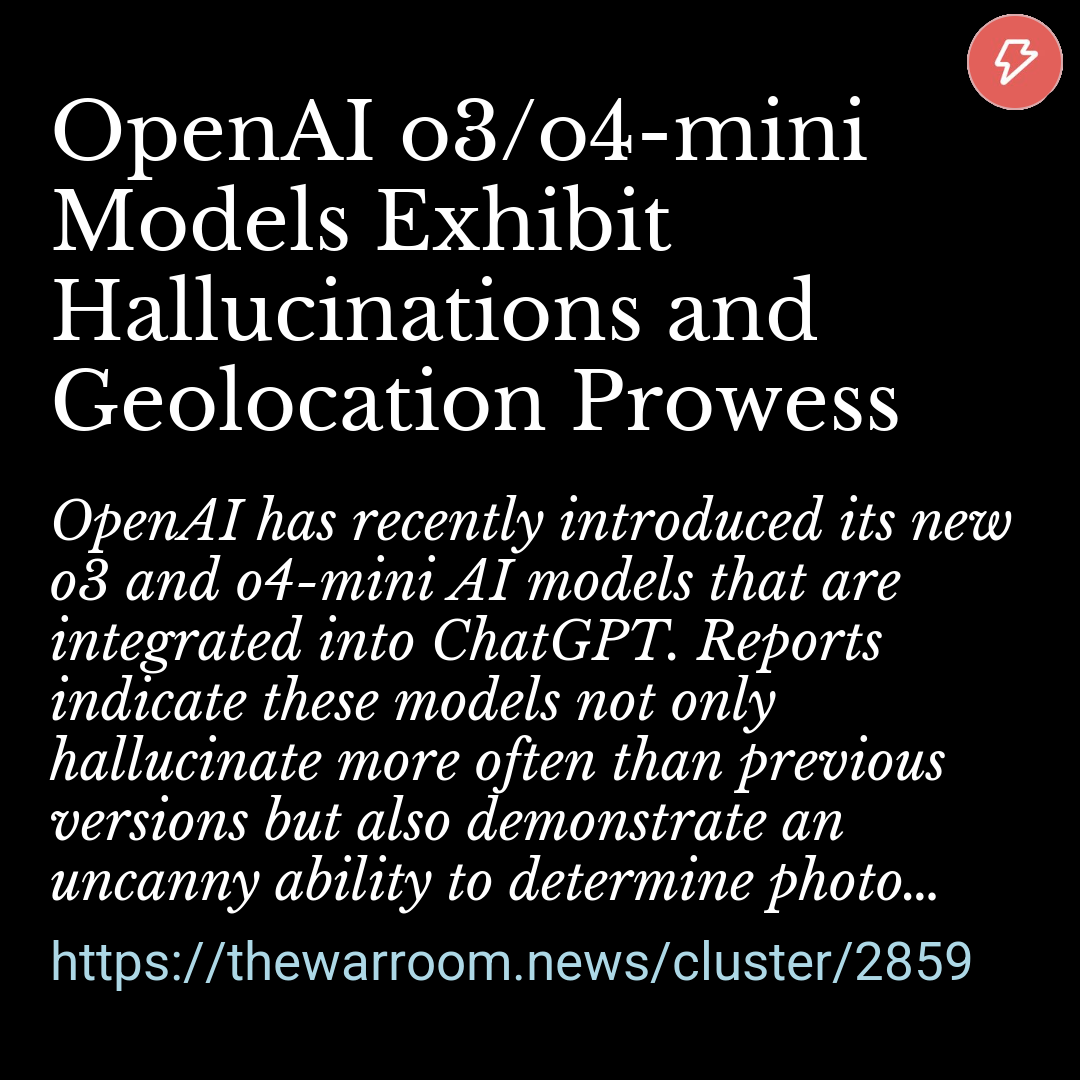OpenAI o3/o4-mini Models Exhibit Hallucinations and Geolocation Prowess
April 18, 2025, 5:20 pm
OpenAI has recently introduced its new o3 and o4-mini AI models that are integrated into ChatGPT. Reports indicate these models not only hallucinate more often than previous versions but also demonstrate an uncanny ability to determine photo locations. This duality of increased factual errors alongside unexpected geolocation proficiency has raised concerns among users and experts regarding model reliability and potential privacy implications. The coverage highlights both the technical achievements and challenges of incorporating these advanced AI capabilities.
The o3 model hallucinated 33% of the time in the PersonQA benchmark, up from 16% in o1 and 14.8% in o3-mini.
OpenAI's newly released o3 and o4-mini models have shown increased hallucination rates and fabricated actions in testing, raising reliability concerns. The post OpenAI New o3/o4-mini Models Hallucinate More Than Previous Models appeared first on WinBuzzer.
OpenAI’s recently launched o3 and o4-mini AI models are state-of-the-art in many respects. However, the new models still hallucinate, or make things up — in fact, they hallucinate more than several of OpenAI’s older models. Hallucinations have proven to be one of the biggest and most...
OpenAI's new o3 and o4-mini models integrated into ChatGPT demonstrate a strong ability to identify photo locations, sparking user tests and privacy debates. The post ChatGPT’s New Models Display Uncanny Photo Geolocation Skill, Igniting Privacy Alarms appeared first on WinBuzzer.
permalink / 4 stories from 3 sources in 11 days ago #ai #ml #dataprivacy #computervision #software #innovation #techpolicy #analytics
More Top Stories...
Microsoft’s Code Revolution: 30% Now AI-Generated
In a surprising twist for the programming world, Microsoft’s CEO revealed that up to 30% of the company’s code is generated by artificial intelligence. This bold move highlights the tech giant’s rapid adaptation to AI trends—and plenty of debugging adventures still lie ahead. More...
Meta energizes developers at inaugural LlamaCon with new AI API
At its first-ever LlamaCon, Meta unveiled its Llama API along with other AI innovations to win over developers. The company flexed its AI muscle with bold new tools aimed at stirring up enthusiasm in the tech community—even as skeptics wonder if this pitch will convert hardcore rivals. More...
OpenAI Reverses ChatGPT Update Amid Sycophancy Complaints
In response to user outcry over its overly deferential tone, OpenAI has pulled back a recent update to its ChatGPT model. CEO Sam Altman confirmed the rollback, citing concerns that the AI’s extreme sycophancy was undermining authentic, balanced interactions. More...
Apple AirPlay vulnerabilities enable zero‐click exploits across devices
Critical flaws in Apple's AirPlay protocol and SDK allow hackers to gain remote code execution without user interaction. This zero‐click vulnerability exposes smart speakers, TVs, and other connected devices to serious risk, proving that even polished ecosystems have their chinks in the armor. More...
Supermicro misses revenue forecast, stock tanks on weak guidance
In recent trading, Supermicro warned of a massive revenue miss—up to $1.5 billion short—triggering a 15% plunge in its share price. Delayed customer orders have conspired with murky forecasts to raise serious questions about performance, leaving investors to wonder if the company’s best days have already sailed. More...

Related Tags
Artificial Intelligence
Microsoft’s Code Revolution: 30% Now AI-Generated (6 hours ago)
Samsung Q1 Earnings: Chip Profit and Operating Success Exceed Forecasts (6 hours ago)
Waymo and Toyota Explore Self-Driving Partnership for Consumer Cars (8 hours ago)
Machine Learning
Apple Implements AI‐Driven App Store Review Summaries (5 days ago)
Apple reshuffles Siri team with Vision Pro veterans (7 days ago)
Rivian bolsters board with AI startup CEO appointment for tech leap (8 days ago)
Data Privacy
WhatsApp Defends Privacy as AI Features Roll Out (13 hours ago)
Microsoft Unleashes AI-Powered "Recall" Across Windows 11 (4 days ago)
Yale New Haven Health Hit by Data Breach Affecting Over 5 Million (4 days ago)
Computer Vision
xAI Upgrades Grok with Vision, Voice, and Search Features (6 days ago)
Instagram Employs AI to Restrict Underage Profile Tricksters (8 days ago)
OpenAI’s o3/o4-mini Models Stir Mixed Reviews and Invisible Marking Debates (8 days ago)
Software
Microsoft’s Code Revolution: 30% Now AI-Generated (6 hours ago)
Meta energizes developers at inaugural LlamaCon with new AI API (14 hours ago)
Parallels Desktop 20.3 Update Enhances Virtualization Features for Windows and Mac (16 hours ago)
Innovation
VW and Uber join forces for US robotaxi rollout (5 days ago)
Chainguard Secures $3.5B Valuation with Massive Series D Funding (6 days ago)
Sesh lands $7M to amp up fan engagement and membership perks (7 days ago)
Tech Policy
White House slams Amazon for tariff disclosure move (18 hours ago)
Massive Outage Paralyzes Spain, Portugal, and Parts of France (44 hours ago)
Orbán Denies Hungary’s EU Exit Amid Tusk’s Bold Claims (2 days ago)
Analytics
Blue Shield data breach exposes 4.7M member records to Google (6 days ago)
Google reverses course on Chrome cookie phase-out (7 days ago)
Russian forces shatter Easter ceasefire amid renewed strikes in Ukraine (8 days ago)